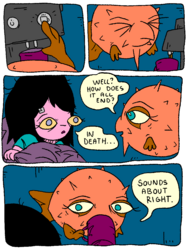The "Tarzan Effect" in Compilers and Software
Akira has this new (actually about a week old, but moderation is notoriously slow in that mailing list) message regarding "Boeing 787, unsound hacks and "Wikinomics".
For those who didn't watch the news, days earlier a plane crashed in India. The landing gear could not be elevated shortly after takeoff (landing gear malfunction seems like a common issue with Boeing planes these days; it happened twice in South Korea just months ago and they call it a side effect) and the large plane - full of passengers at the time - fell onto residential areas, killing people not just onboard the plane but also across surrounding neighbourhoods. It's worth noting that a lot of Boeing jobs were outsourced to low-paid staff in that area. It was all about money. There wasn't really a skills shortage in the US.
The software side aside, what about the mechanics? What happens when you forcibly make things 'work', either by hacks or by disregarding warnings (like those that compilers tend to issue)?
Akira talks about this:
While the exact cause of the crash of the Boeing 787 in Ahmedabad, India (June 12) has not yet been determined there are voices suggesting that the manufacturer's corporate culture should be examined. Boeing once was celebrated for its safety record. A series of accidents has tarnished the good name.
I have read several articles which examine Boeing aircraft incidents and quality control issues. The following is one such:
The Boeing 787 Dreamliner's Long History of Safety Concerns https://www.yahoo.com/news/boeing-787-dreamliners-long-history-154242482.html
Last year [2024] turned out to be a bad one for Boeing and the Dreamliner ... In January another whistleblower, engineer Sam Salehpour, came forward, reporting that sections of the fuselage of the Dreamliner were improperly connected, with gaps that could cause the plane to break apart during flight. When the sections wouldn't fit, Salehpour claimed, workers would resort to brute force.
"I literally saw people jumping on the pieces of the airplane to get them to align," Salehpour said in Capitol Hill testimony. "By jumping up and down, you're deforming parts so that the holes align temporarily. I called it the Tarzan effect."
This whistle-blower's account of application of excess force to align components reminds me of doing work with commercial compilers and interpreters before GNU became available.
Compilers and interpreters had bugs which prevented proper code from functioning. Fixes often took the form of complicated, hard to understand code.
Some engineers used unsound hacks to get around the problems. The "Tarzan effect" described above reminds me of those brutal work-arounds.
The book "Wikinomics: How Mass Collaboration Changes Everything" by Don Tapscott and Anthony D. Williams claims that the development model pioneered in software development is being adopted in various fields of industry. The book devotes an entire chapter on the development of the Boeing 787, claiming that it was a notable success.
"Wikinomics" was published in December 2006. The Boeing 787 was initially scheduled to make its maiden flight in August 2007 but quality issues led to delay after delay. The 787 took off at last in December 2009. Aviation industry observers say that Boeing outsourced component design and quality control in an unprecedented scale. Without the necessary oversight, communication gaps emerged which led to quality issues. What we now know of actual Boeing 787 development, as opposed to the narrative by Tapscott and Williams, does not resemble the cooperative efforts that produced GNU free software.
It appears to me that the authors of "Wikinomics" are much interested in cost savings that innovations in the design and development process bring forth. Free software indeed leads to cost savings, but that is a secondary benefit. The primary purpose of free software is to give people freedom.
It is also likely that there were voices of concern within the Boeing 787 development team which went unnoticed by the authors. It may be that they got too much of their information from corporate PR. It is also possible that engineers were not totally free to discuss their concerns.
---
See also:
Boeing's 787 Dreamliner Has a Long History of Safety Concerns https://time.com/7293945/boeing-787-dreamliner-long-history-safety-concerns/
The Problem Boeing Ran Into After Outsourcing 787 Production https://simpleflying.com/boeing-problem-outsourcing-787/
Past libreplanet article:
Subject: "Wikinomics" on Boeing and GNU Date: Mon, 8 Jan 2024 08:33:35 +0900 (JST)
https://lists.gnu.org/archive/html/libreplanet-discuss/2024-01/msg00003.htm
There is a typo in this older article. It mentions "787-Max" which does not exist. Correct is "737-Max"
Last paragraph of the above:
What does "Wikinomics" say about GNU? It says nothing. There is no mention of GNU anywhere. It does mention that Finnish student Linus Torvalds made a simple version of the UNIX operating system. As we here all know, this description is not accurate. We can see this as evidence of the shallowness of the research which went into the book. All this is unfortunate for the book is so widely known.
Airbus seems to have benefited from Boeing's failings. Likewise, Free software benefits from proprietary software vendors trying to hide their defects (secret code), only to make unreliable software, resulting in random crashes (even suicides) with no good explanation for their occurrence. █

